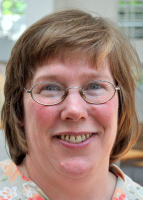
Katherine Zieman, an assistant professor of English at the University of Notre Dame, has been awarded a National Humanities Center Fellowship for work on her next book, “Richard Rolle and His Readers: Defining the Literary in the Fifteenth Century.” She is one of just 36 fellows selected to spend the 2010-11 academic year working at the North Carolina-based center.
“My year at the center allows me to devote my full attention to this project—and offers the opportunity to converse with other scholars in the humanities in different periods and disciplines who share my interests,” Zieman says.
Her current research focuses on various manuscripts of the works of the 14th century Yorkshire hermit Richard Rolle, who wrote devotional treatises and biblical commentary in both Latin and English.
“My examination of the late medieval popularity of Rolle’s writings,” Zieman says, “seeks to place the proliferation of religious writing in the 15th century in dialogue with the canonization of Geoffrey Chaucer as a writer of imaginative fiction to talk about what we count as ‘literature’ and what function writing serves in different cultures.”
Zieman specializes in late medieval English literature and culture with particular interests in liturgical practices, definitions of literacy, and the construction of “literary” culture. She has published articles on Chaucer and the liturgical practices of women religious. Her 2008 book, “Singing the New Song: Literacy, Liturgy, and Literature in Late Medieval England,” explores the intersections of these issues in the late 14th century.
To continue research on her Richard Rolle project, Zieman also has been awarded a month-long fellowship at the Huntington Library in San Marino, Calif., and a one-year fellowship from the American Council of Learned Societies, a private, nonprofit federation of 70 national scholarly organizations and a preeminent representative of American scholarship in the humanities and related social sciences.
The National Humanities Center is a leading independent institute for advanced study dedicated to the humanities. The center provides a national focus for the best work in the liberal arts, drawing attention to the enduring value of ancient and modern history, language and literature, ethical and moral reflection, artistic and cultural traditions, and critical thought in every area of humanistic investigation. By encouraging excellence in scholarship, the center seeks to ensure the continuing strength of the liberal arts and to affirm the importance of the humanities in American life.